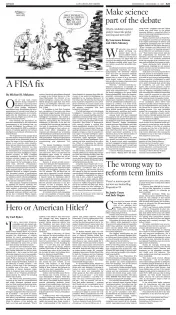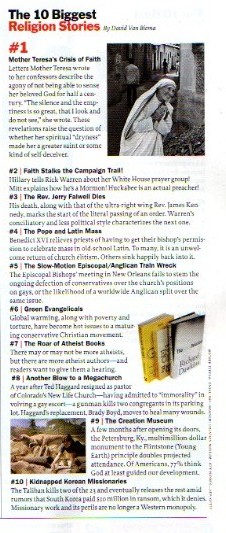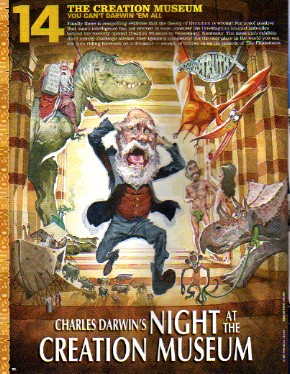Lawrence “It’s a lie!” Krauss and Chris Mooney, a Seed magazine correspondent and blogger, are publicly promoting a litmus test for the 2008 presidential candidates. [See also Krauss’s Wall Street Journal opinion piece.] We’re quite sure a candidate’s view of evolution, creationism, and intelligent design will be one of the prime qualifying tests Krauss and the gang at Science Debate 2008 will be applying. If there’s any doubt one need only peruse the list of some of the supporters on the Science Debate 2008 website:
Niles Eldredge – Curator, Division of Paleontology, The American Museum of Natural History
John F. Haught – Senior Fellow, Science & Religion, Woodstock Theological Center, Georgetown University
Paul Kurtz – Emeritus Professor of Philosophy, State University of New York at Buffalo; Chairman, Center for Inquiry
Lawrence M. Krauss – Ambrose Swasey Professor of Physics and Astronomy and Director, Center for Education and Research in Cosmology and Astrophysics, Case Western Reserve
Kenneth R. Miller – Professor of Biology, Brown University; co-author of “Biology”
Randy Olson – Marine Ecologist, Filmmaker, “Flock of Dodos”
Kevin Padian – Professor and Curator Department of Integrative Biology and Museum of Paleontology University of California, Berkeley
John Rennie – Editor-In-Chief, Scientific American
Eugenie C. Scott – Executive Director, National Center for Science Education
All the above are well-known evolutionists with a long history of fighting creationists and intelligent design proponents.
CP
 Make science part of the debate
Make science part of the debate
by Lawrence Krauss and Chris Mooney
Los Angeles Times (California), page A31
December 12, 2007
Whether the issue is global warming, embryonic stem cell research, ballistic missile defense or the future of the world�s oceans, the same bass line thumps in the background: Sound political decision-making relies, more than ever before, on accurate scientific information.
As advances in science and technology continually transform our world, policymaking will inevitably depend more and more on accurate scientific and technical information. Which means that in order to be a successful world leader today, a politician must have an effective means of accessing and applying the latest science.
This fact � combined with the undisputed importance of scientific research and innovation to national prosperity and competitiveness � explains the recent emergence of a group called ScienceDebate2008. Under its auspices, scientists, university presidents, industry leaders, elected representatives and others have endorsed a call for the current U.S. presidential candidates to participate in a debate, or a series of debates, dedicated to issues in science and technology. More specifically, the candidates should answer questions about the environment, medicine and health, and science and technology policy.
read more…
by Massimo Gaggi



